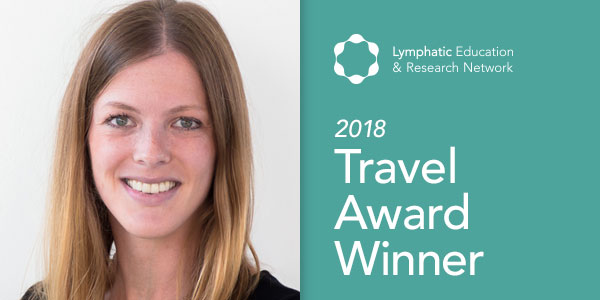A guest blog post by Esther Hoppe, 2018 GRC Travel Award Winner
Esther Hoppe, currently a Ph.D. student at the Max Planck Institute for molecular biomedicine in Muenster, Germany, under the supervision of Prof. Friedemann Kiefer received a Travel Award from LE&RN to attend the 20th International Vascular Biology Meeting (IVBM) in Helsinki, Finland. We asked Esther to share her thoughts on that experience with us and to tell us a bit about her research and future plans.
Experience at the IVBM
The IVBM 2018 in Helsinki was the first IVBM I attended. It was inspiring to listen to the leaders in the field and be exposed to the high-quality data they presented. I felt it was important to attend such a conference to be integrated into the field of vascular biology and to get insights into the newest findings and a global overview of research interests. I got the chance to present my own work in a poster and to discuss my data with researchers from different labs. The exchange of ideas and new approaches but also technical problems forms a feeling of unity among researches from all over the world. This points out the great importance of knowledge exchange among researchers from different nations and unifies the field of vascular biology.
Current research interests
For my Ph.D. thesis, I am working on the investigation of genes that contribute to proper lymphatic vessel development and functional maintenance in the established adult lymphatic vasculature. Recently, I studied one of the main adhesion molecules present in the cell-cell contacts between lymphatic endothelial cells, VE-cadherin, and detected striking organ-specific dysfunctions of the lymphatic vasculature, following the loss of VE-cadherin. I believe that the identification of molecules that contribute to the development and function of lymphatic vessels helps to find therapeutic targets to treat lymphatic diseases.
Hopes and plans for career and research
Within the next two years, I am planning to finish my Ph.D. at the Max Planck Institute in Muenster. Here, I experience a supportive environment in the field of vascular biology. I’d like to continue my research as a Postdoc to identify genes and molecular interactions that are essential for development and function of the lymphatic system. I hope that further development of imaging techniques, as well as biochemical approaches, helps to further our understanding of the interplay of molecules for proper function of the organ-specific vasculature and helps to expand our knowledge of how lymphatic vessels react to different kinds of defects.
For a long time, the importance of a functional lymphatic vasculature was not well understood and also underestimated. Fortunately, within the last years of research, lymphatic vessels became more and more appreciated as major players in health and disease and became a topic of interest for many researchers. Our understanding of molecular mechanisms underlying proper lymphatic function is growing constantly, as researchers from the lymphatic community steadily identify new and essential functions of lymphatic vessels. I am convinced that the next years of investigation will draw more attention to lymphatic vessels and their importance. LE&RN is a major contributor to drawing attention to the high number of patients who suffer from lymphatic disease and the importance of further investigation.
LE&RN programs, like LE&RN Travel Awards, are only possible because of our Partners and Supporting Members. Become a Supporting Member today.

